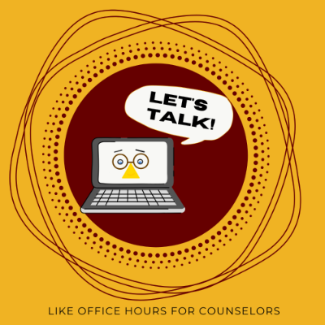 Let’s Talk is a way for students to have easy access to free conversations with counselors
from Winthrop’s Counseling Services and is designed to operate as a drop-in service
– no appointments are necessary and there is no paperwork to fill out. These walk-in
hours allow for quick, casual conversations – think of it as “office hours” for counselors.
Let’s Talk is a way for students to have easy access to free conversations with counselors
from Winthrop’s Counseling Services and is designed to operate as a drop-in service
– no appointments are necessary and there is no paperwork to fill out. These walk-in
hours allow for quick, casual conversations – think of it as “office hours” for counselors.
Any Winthrop student is welcome to come to Let’s Talk hours. By utilizing Zoom, students have access to Let’s Talk from wherever they happen to be and don’t have to worry about making it to a specific space on campus during our available Let’s Talk hours. Faculty and Staff are also encouraged to utilize Let’s Talk if they have concerns about a student and need assistance in referring that student to Counseling Services. Visitors are seen on a first-come, first-served basis.
In order to use Let’s Talk online services, students will need access to a reliable internet connection and a device with a webcam. There are two requirements for students who are utilizing Let’s Talk online services, which are for your safety and to help us in assisting you:
Visits to Let’s Talk typically last about 15 minutes. During that time, you’re encouraged to talk about whatever is important to you. The counselor will listen closely to your concerns and provide support, guidance, assistance in problem solving, and/or referrals to resources that may be helpful.
Let’s Talk is a good fit for:
Let’s Talk is not a good fit for:
Although the counselors who staff Let’s Talk are clinical mental health counselors, Let’s Talk is not formal counseling and is not a substitute for mental health treatment. Let’s Talk visits are brief, drop-in conversations with a counselor (usually 15 minutes or less). Ongoing clinical counseling occurs within the context of a therapeutic relationship, where the therapist and client meet on a regularly scheduled basis to address specific concerns or patterns the student would like help with.
Visits to Let’s Talk are considered private, but not confidential. In an emergency where there is imminent threat of harm or danger to themselves or others, the counselor may need to share information to ensure safety. Counselors are also required by law to report the abuse of an elder, child, or other vulnerable person who is incapacitated and/or unable to act on their own behalf if being abused. However, visits to Let’s Talk are not recorded as part of a student’s university record or clinical record in Counseling Services.
No – Let’s Talk is not a clinical service and the brief nature of the meetings does not allow for the counselors there to appropriately support students in crisis. Students needing urgent crisis support (e.g., thoughts of killing/hurting self or others, recent assault, etc.) should contact the front desk at Center for Student Wellness by calling 803/323-2206 and request a same-day appointment with a counselor.
Let’s Talk is not a replacement for ongoing counseling. If you would like to meet with your counselor sooner than your next appointment, contact your counselor directly or call the front desk at 803/323-2206.
Students who feel they need additional support outside their regular counseling sessions are encouraged to explore our group counseling options or sign up for TAO using their Winthrop e-mail address to gain additional skills and support.
In this situation, it’s best to talk with your counselor directly – we value your feedback, both positive and negative, about our work together. An open, honest conversation between you and your counselor can often address your concern and help you in working better together. (Sometimes, it’s easiest to begin this conversation with a written letter or e-mail!) If you are still unhappy after your conversation with your counselor and would like to transfer to a new counselor, simply contact the front desk to schedule with a different counselor.
Let’s Talk will begin the week of February 8. The current schedule is listed below, including the links for joining. Cancellations or modifications to the schedule can be found on our social media pages (@counselingwu).